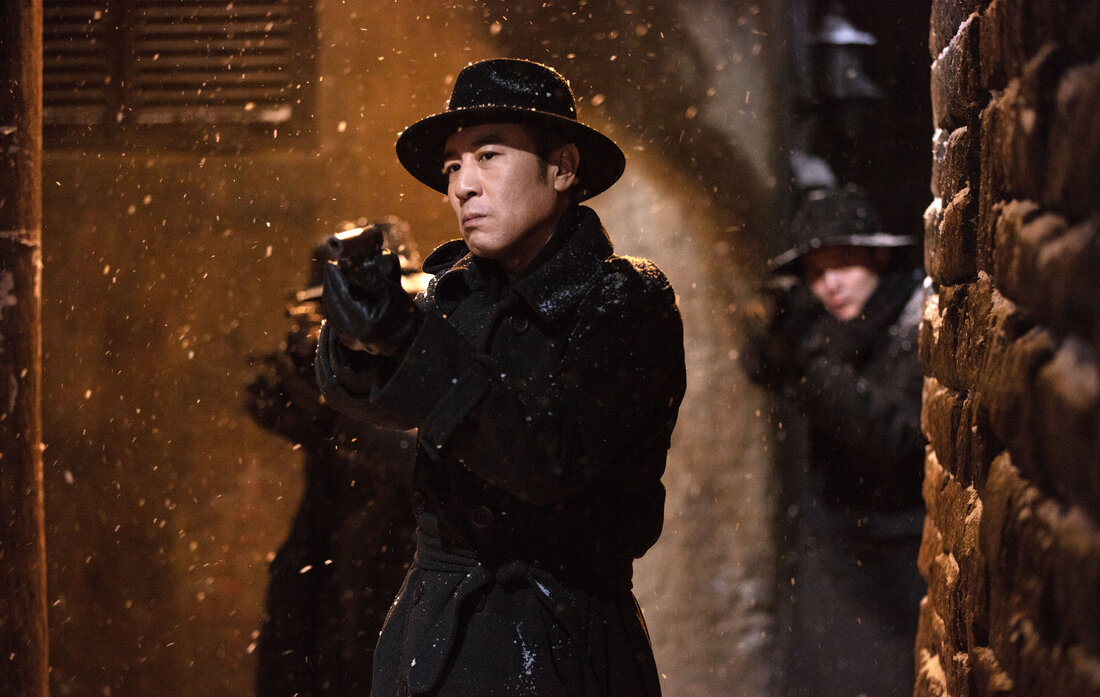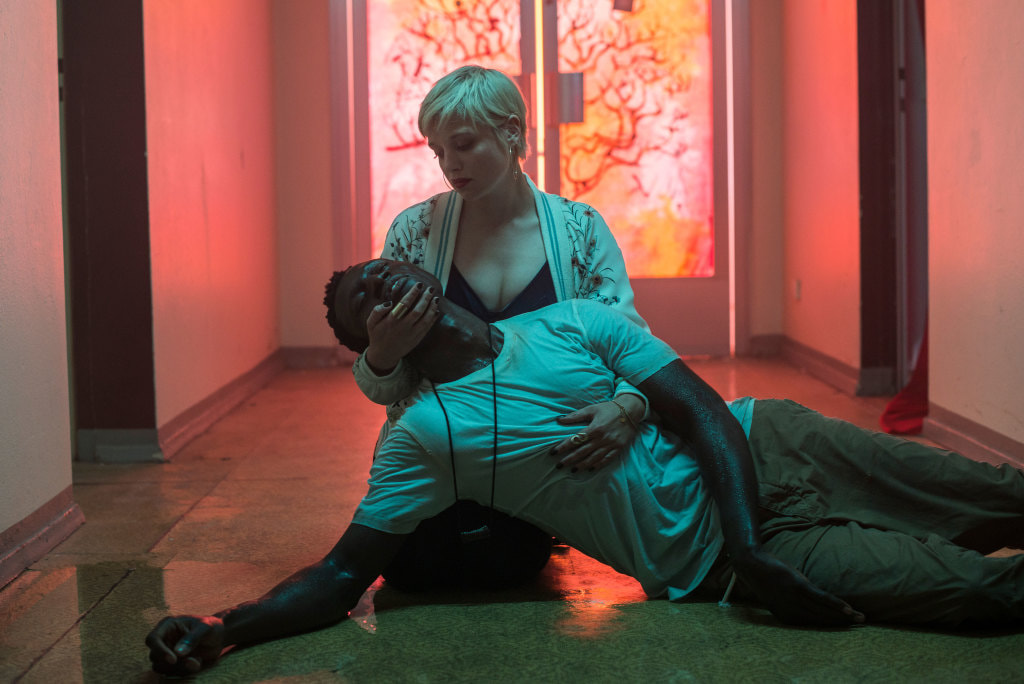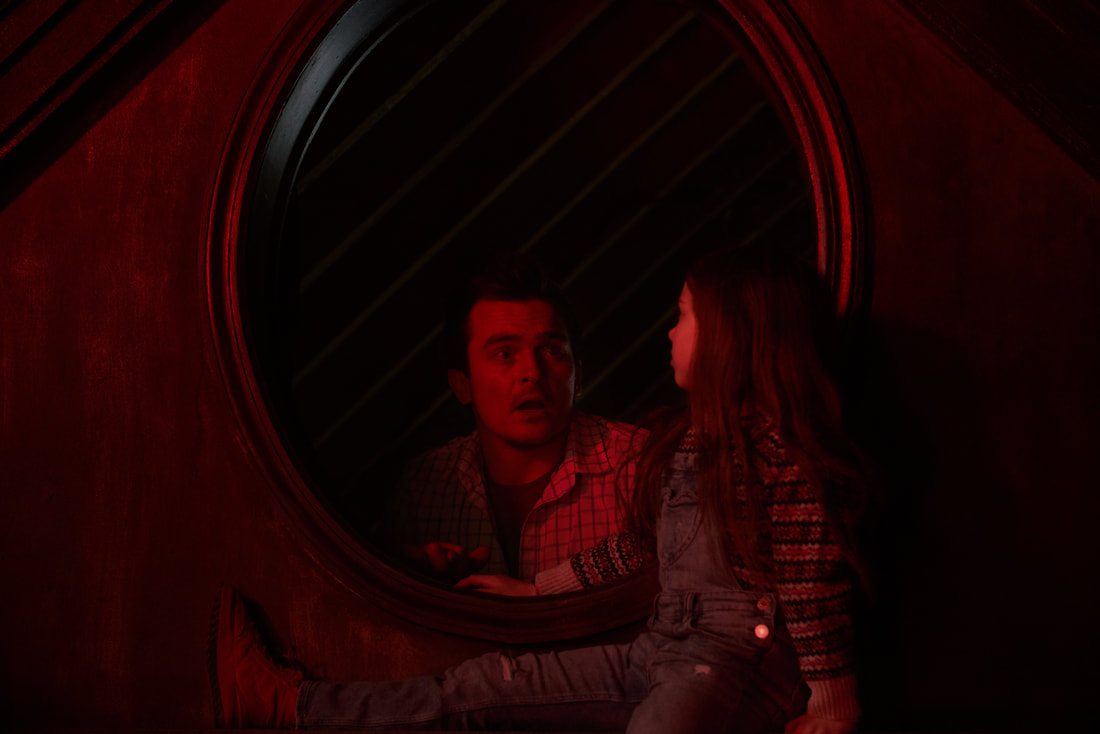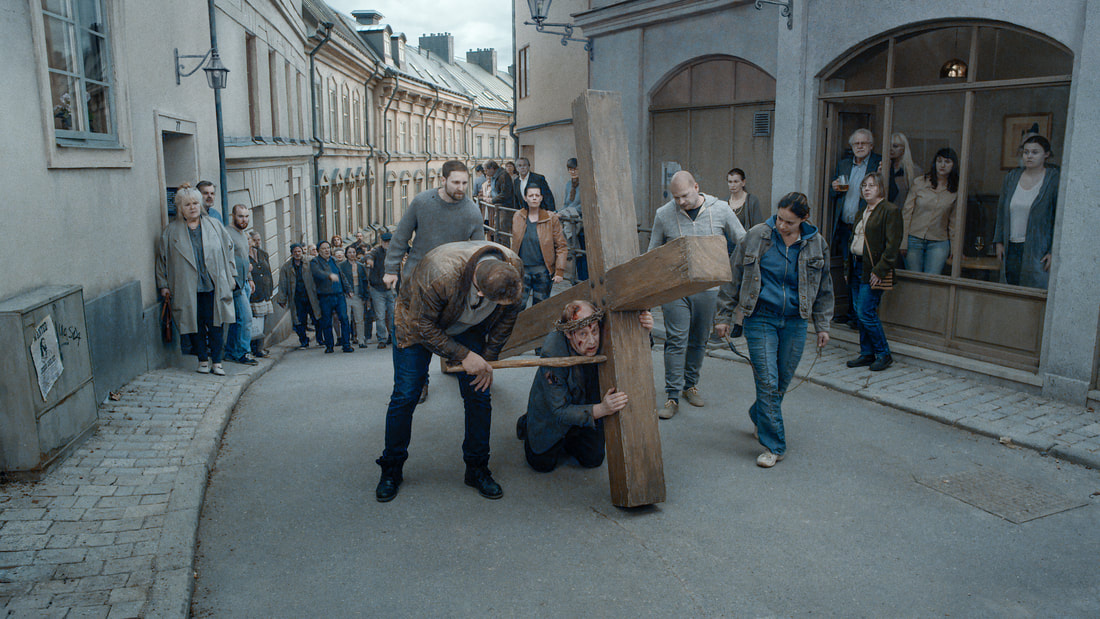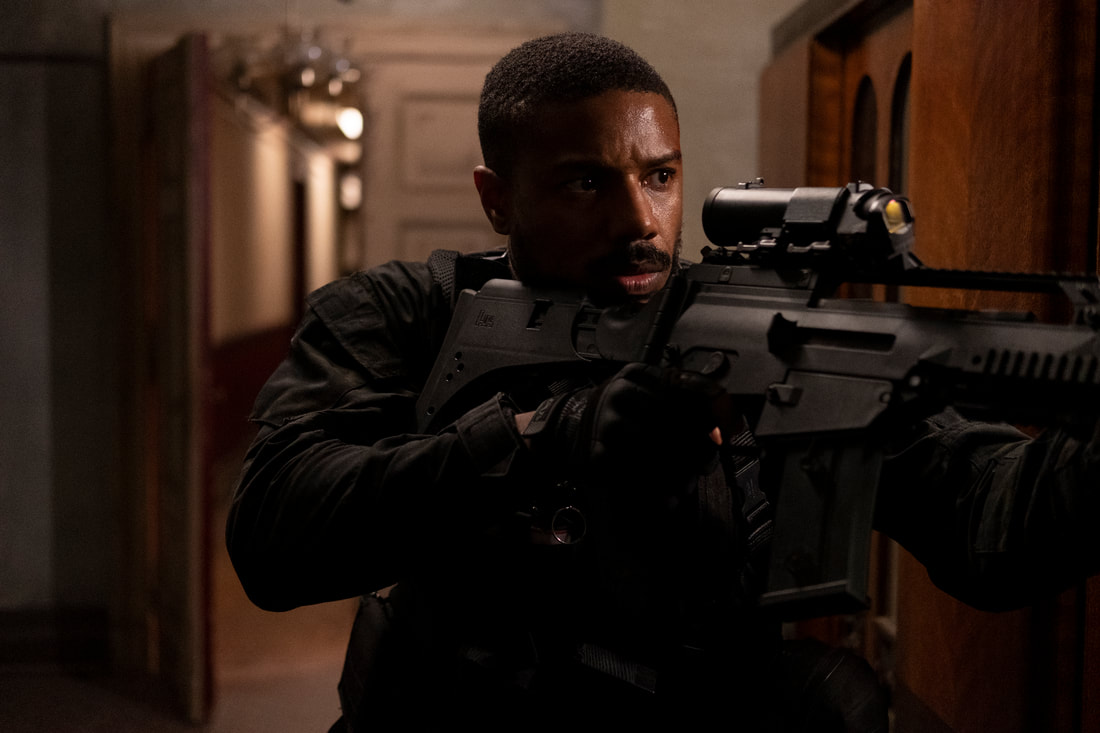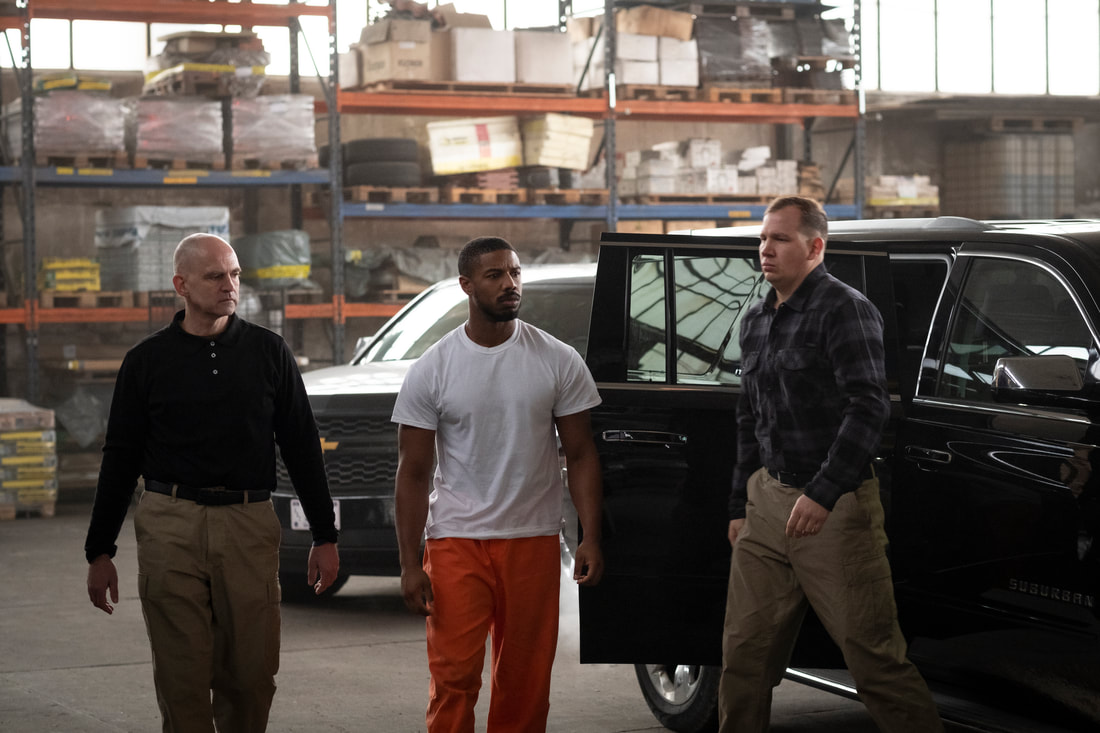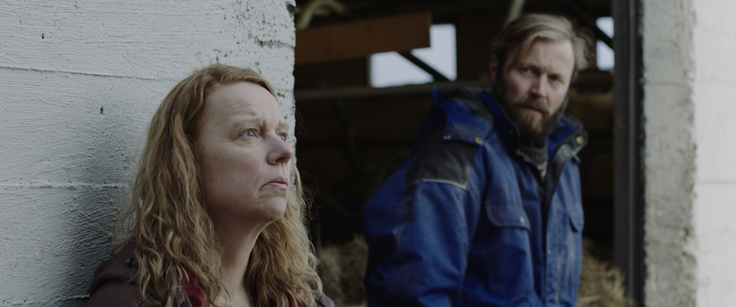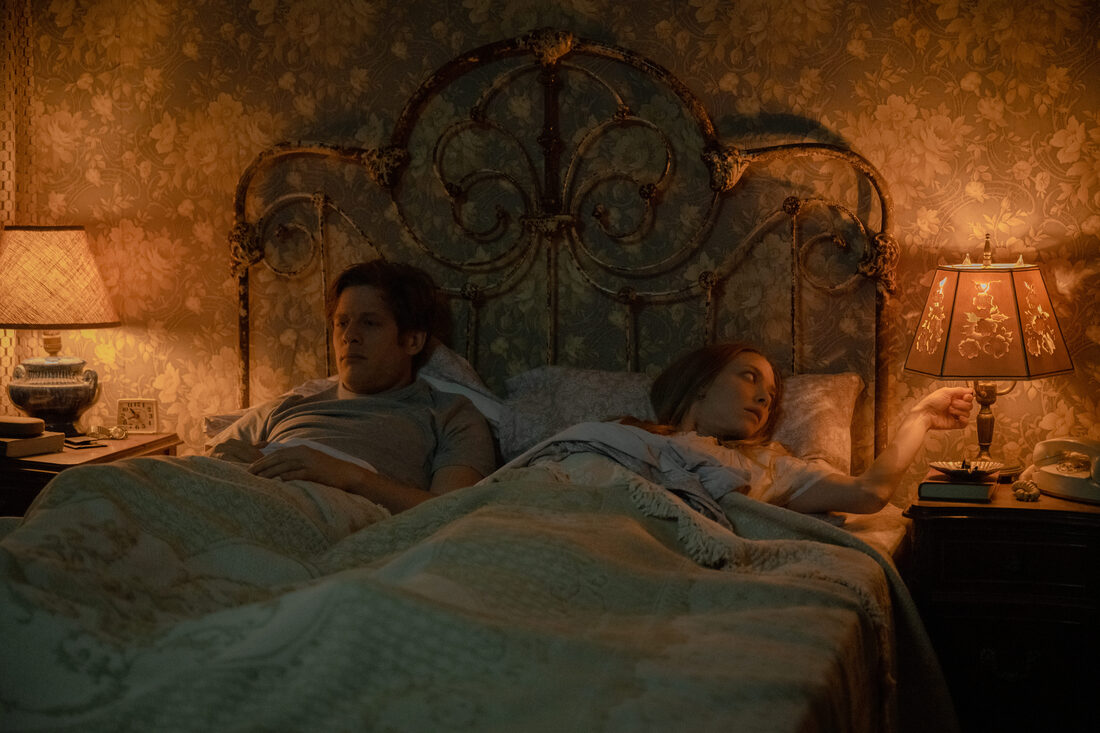|
Review by Sean Boelman
There have already been a lot of documentaries to come out about the COVID-19 pandemic, but none has taken as unique of an approach as Udi Nir and Sagi Bornstein’s Viral. Exploring the ways that people have remained connected in light of the circumstances, this is maybe the most humanistic film about the topic so far.
The movie follows seven people who cope with the loneliness and struggles of the pandemic through social media. Since almost all of us had to be separated from our friends and loved ones for at least part of last year, this is a story that audiences will connect with, at least to some extent. As is the case with a lot of documentaries that follow multiple subjects, there are some storylines here that are more effective than others. Some portions of the film follow people who are just trying to go about their daily lives with new adjustments, and others deal with some more extraordinary situations. Nir and Bornstein seem to recognize which of these stories are most interesting, and therefore give them a more significant portion of the movie’s focus. One of the more prominent storylines is a love story between a cruise ship worker and her overseas romantic partner, and this is the one that will perhaps most easily invest the audience.
Part of what makes this film stand out is how hopeful its approach to the pandemic is. Yes, there is a section in which the subjects are voicing their grievances with what they are having to go through, but the emphasis is more on how they were able to make the most of their situation to find some form of happiness.
With this more lighthearted tone comes a sense of humor that one doesn’t expect to see in a movie like this. Although there aren’t the gloom-and-doom scenes of people who are sick and dying, it never feels like Nir and Bornstein aren’t taking the situation seriously. It finds that perfect balance between meaningful and optimistic. The footage is predominantly taken on cell phones and laptops as the subjects’ personal diaries. It may not be the most cinematic thing to watch, but it’s exactly what this type of story calls for, as these devices are what we have lived with as a society for the past year and it is only fitting that we are using them for our storytelling as well. Viral is a very interesting documentary that tells some of the stories of the pandemic that we haven’t seen so many films about yet. It hits close to home, but in a way that makes it a great snapshot of the current moment. Viral is screening as a part of the 2021 Hot Docs Film Festival, which runs April 29 through May 9. Rating: 4/5
0 Comments
Review by Sean Boelman
With her documentary As I Want, filmmaker Samaher Alqadi sets out to skewer the misogyny that radiates through patriarchal society. Thoroughly affecting, if not entirely organized, Alqadi’s film is at its best when it leans more towards being a personal essay than a mere political statement.
The movie follows the filmmaker as she examines the uprising of women fighting in Egypt against a surge in sexual assaults and reflects upon her role as a woman and mother in the Middle East. It’s an important story, and unfortunately things like this too often don’t see the light of day in the media. Admittedly, Alqadi almost tries to bite off more than she can chew in the film, trying to tackle the ideas of womanhood and motherhood, while at the same time trying to pull apart the patriarchal ideas of Middle Eastern society that have resulted in this situation becoming so dangerous and urgent in the first place. At under an hour and a half, Alqadi is forced to jump between the different issues at a pace that is not always the most fulfilling. A lot of what Alqadi has to say is fascinating, but just as soon as she really starts going somewhere with one aspect of the movie, she has to pivot to one of the other themes. This is clearly a very personal film for Alqadi, and that is a large part of what makes it so powerful. Alqadi gives some very intimate access into aspects of her life, and when she begins to explore her own past, it becomes even more so. It is honest, small-scale stories like this that really hit home the effects that these issues have upon their victims. There are definitely moments in the movie that are hard to watch, like footage of a sexual assault which happens in a large crowd. However, Alqadi is not presenting these in a way that is excessive or insensitive, but rather, to communicate to the audience the horrors that women experience at the hands of men. Stylistically, Alqadi’s film is not consistent, but it is very ambitious. For the most part, the footage is run-and-gun footage taken by Alqadi as she uses the camera as a means of protecting herself. There are also some poetic moments in the movie, and although they are well-done, they are too sporadic to be fully effective. As I Want is an important film because it deals with themes that desperately need to be discussed. Samaher Alqadi shows a lot of talent as a filmmaker, even if it is somewhat unrefined. As I Want is screening as part of CPH:DOX, which runs April 21 through May 2. Rating: 3.5/5
Review by Sean Boelman
Zhang Yimou is undoubtedly one of the finest directors of our time, having directed some of the greatest action movies of the 21st century. It is understandable why fans are excited to see his first foray into the spy thriller genre, but unfortunately his talents are wasted on Cliff Walkers, which amounts to little more than a Chinese propaganda film.
The movie follows four Communist Party special agents who return to China after training in the Soviet Union, only to find themselves at odds with their Japanese oppressors when a traitor is revealed in their ranks. It’s a convoluted film of double crosses and espionage, and while the team’s “secret mission” is only alluded to, we know it’s true purpose due to the nature of the movie. Much of what the film has to say about heroism and martyrdom won’t mean anything to Western audiences. This is a movie made to honor the heroes of the revolution, and it plays out as such. Although it’s not quite as jingoistic as a lot of Chinese blockbusters with patriotic themes, these ideas are still there, and not very subtle. The film’s biggest shortcoming is its lack of character development. The audience isn’t given a whole lot of context as to who these characters are. While this will likely be more forgivable for Chinese viewers who identify with them as countrymen, American audiences will be left questioning who these characters are and why they are important.
This is largely an ensemble piece, and while the movie does contain some notable Chinese stars, the script never affords them the opportunity to shine on an individual level. Ultimately, everyone involved in this production — even Zhang — is just another cog in the machine to make this nationalist propaganda.
There are a few cool action set pieces in the film, and these keep it interesting despite the script’s deficiencies in intrigue. Ultimately, it really isn’t anything we haven’t seen before — with a few snow-bound shootouts and one low-octane car chase — and it pales in comparison to the creative choreography that Zhang's movies have had in the past. However, the action is one area that benefits heavily from Zhang's presence. The script by Yongxian Quan is very basic and would have been quickly forgotten were it not for Zhang's characteristically beautiful visuals. The cinematography is excellent, and Zhang consistently uses the snowy setting of the film to his advantage. Cliff Walkers is a decent movie, but it’s far from ranking among Zhang's best. Pretty visuals and a few great moments aside, this is a forgettable thriller made primarily for Chinese audiences, and American viewers have no real reason to seek it out unless if they are a hardcore fan of the filmmaker’s work. Cliff Walkers is now in theaters. Rating: 3/5
Review by Sean Boelman
There has already been an iconic screen adaptation of Alfred Döblin’s acclaimed novel Berlin Alexanderplatz, so viewers are left to ask why there was a need to adapt it again. A modernized take on the epic crime saga, Burhan Qurbani’s vision of the source material is interesting, even if it isn’t as unique as he would have hoped.
The film follows a refugee living in Berlin who is drawn into a life of crime after befriending a drug dealer. To give credit where credit is due, Döblin’s novel — which came out in 1929 — set the bar for tragic crime stories such as this. However, this is an arc that has been told this way so many times before. Qurbani and Martin Behnke have changed the protagonist from being a disillusioned ex-con to a disillusioned refugee in order to make the story feel a bit more timely. Although this does provide some interesting commentary on the hostility that Germany has towards immigrants, it also makes this classic story feel like an imitation of itself. At three hours in length, the movie is much shorter than Rainer Werner Fassbinder’s epic television adaptation of the novel, and it moves along pretty nicely. Qurbani has figured out how to build and sustain tension through drama without making it feel overly soapy. The shocking moments don’t quite shock because of their familiarity, but they are entertaining nonetheless.
The character development in the film is what is lacking. All of these characters feel like stereotypes. Francis is the cliched refugee who wanted to make himself a new, better life, but ends up in even deeper trouble than before. Mieze is the prostitute with a heart of gold, whose only purpose is to push along the character’s arc. For a movie that wants to be socially conscious, it’s frustrating to see such reductive characters.
That said, the performances in the film are absolutely astounding. Welket Bungué is phenomenal as the lead. He does such a great job of commanding the screen and carrying the emotional weight of the movie. On the opposite end of the spectrum, Albrecht Schuch gives a slightly hammy performance as his drug dealing accomplice, and it works. The film is also visually wonderful. The cinematography by Yoshi Heimrath is drenched in neon in a way that creates a dreamlike but not soothing feel. This, contrasted with the harsh reality of the Berlin streets on which much of the movie’s action takes place, is a unique tone that fits the project quite well. Berlin Alexanderplatz impresses in many regards but falls flat in others. Ultimately, it’s another arguably unnecessary attempt at re-adapting classic source material, even if it does have its own merits. Berlin Alexanderplatz is now in theaters and virtual cinemas. A list of participating locations can be found here. Rating: 4/5
Review by Sean Boelman
Director William Brent Bell isn’t exactly known for making the best quality horror movies, but they are generally at least pretty entertaining, and that fills a void left at multiplexes by the pandemic. Unfortunately for cinemagoers, his latest film Separation isn’t particularly scary, but it’s perhaps a bit more perceptive than it initially lets on.
The movie follows a comic book artist and his daughter whose lives begin to unravel after they experience a terrible tragedy. The marketing would have you think that this is a supernatural horror flick, and while there are definitely elements of that there, it’s more a divorce drama than anything. That said, it’s highly unlikely that anyone is coming to a mainstream horror movie with the intention of seeing stirring family drama. There are a few cool and mildly creepy images spread throughout the film, but nothing is ever startling, much less dread-inducing. As a horror movie, this is entirely lacking in originality in its approach. Additionally, the film is either far too much or far too little in terms of its themes. Portions of the movie that explore the protagonist’s struggle to be a better father are really conventional and on the nose, but there is an entire storyline about grief that is underdeveloped to the point of feeling like an afterthought. If a horror film is going to go for a cross-genre approach, it at least needs to be fully developed.
All of the characters are also very generic. The protagonist is a slacker father who means the best and wants to be there for his kid, but always seems to come up short. There is the rich father-in-law trying to take away his grandchild because he thinks he knows what is best. And the twist can be seen a mile away because of shoddy character development.
Still, the actors are able to take these thinly-written roles and make them somewhat compelling. Rupert Friend plays the lead, and while his turn isn’t a show-stopper, it makes one intrigued to see what he could do with a full-fledged horror flick. Celebrated actor Brian Cox also shows up in the supporting cast, and surprisingly isn’t wasted, giving a decent turn to elevate a mediocre film. Bell tries to do some ambitious things with his movie stylistically, but perhaps due to low budget or more likely indecisiveness, his vision is never expounded upon. There are some interesting things in the supernatural aspect of the film, but it never goes all-in on world-building, and as such, these scenes feel out-of-place. Separation is watchable, even if it works slightly better as a drama than a horror flick. Regardless, theaters are in desperate need of content right now regardless of quality, and this is worthy enough to sell a few tickets. Separation opens in theaters on April 30. Rating: 2.5/5
Review by Sean Boelman
Roy Andersson’s About Endlessness is an art film in the most classical sense of the word — an abstract series of images connected by theme and not a whole lot else. And while there are some effective moments sprinkled throughout, its rambling meditations are unlikely to resonate with a majority of viewers.
The movie is a reflection on life and humanity as told through narrated vignettes depicting mundane happenings and historical events. Ultimately, the thing that the film seems to be most lacking in is structure. These images are often very profound, but there isn’t the connective tissue tying them together to make them into something greater. Andersson’s film is definitely very erratically paced in that there are long stretches of stillness (even near-nothingness) and others that are total chaos. Viewers can expect to feel some pretty significant cinematic whiplash going from soothing scenes of people sitting down to someone walking through the street being whipped while carrying a crucifix. It is clear that Andersson is more interested in exploring themes than anything else, and he does so with mixed success here. While he often says what he wants to get across in a way that is subtle and intriguing, he occasionally tries to go a bit more overt with the symbolism and it feels like he is beating the audience over the head.
Part of what makes the movie fail is that there isn’t as much connection with the characters as there needs to be. Of course, with this taking more of a vignette-based structure, it’s understandable that there isn’t as much of a focus on fleshing out each individual person, but the movie fails to connect us with them beyond our common humanity.
The acting of the film is also somewhat awkward. It’s as if Andersson got everyone in front of the camera and told them to try to act natural. It’s not that they are over-acting and going too big, even in the more extreme sequences, but rather, that everything feels artificial and forced in an attempt to make it mean something. That said, the movie is absolutely gorgeous to look at. The cinematography by Gergely Pálos is stunning, with a few images that are absolutely unforgettable. It’s a work of astounding visual poetry, almost making up for the fact that its attempts at literal poetry through its writing so frequently fall flat. About Endlessness is the type of film that scholars will be debating years from now, even if it doesn’t quite deserve it. It’s undeniably gorgeous, but struggles to straddle the line between ambiguous and abstract, leaving the viewer mostly unfulfilled. About Endlessness hits theaters and VOD on April 30. Rating: 3/5 Reviewed by Adam Donato Michael B. Jordan is one of the hottest young actors working in Hollywood today. Snagging the lead role in a Tom Clancy franchise movie is very on-brand as he headlines other manly franchises like Creed and Black Panther. Unfortunately for Jordan, an update on his box office stardom will have to wait as this action thriller heads to Amazon Prime. Jordan isn’t the box office guarantee like Liam Neeson, but April has been much more fruitful for theaters than January and The Marksman was able to scrape out $15 million domestically then. Damn pandemic. The Rocky brand holds more water than Tom Clancy, but it would’ve been interesting to see if Michael B. Jordan could carry the box office like he carries this movie. There’s nothing new here when it comes to the story. Clancy isn’t even to blame though, because the script is nothing like the book. It is reasonable to be disappointed still because one of the writers for the movie was Taylor Sheridan. That being said, the story is fine and allows for the best part of the movie, Jordan taking people out. Regardless of how whatever the movie is, watching this super agent take care of business is entertaining enough. Not to mention, a good portion of this movie takes place underwater because Jordan has lungs the size of his balls. In all seriousness, he handles the emotional beats. He kicked ass and looked good doing it. There was enough personality being showcased while doing it for the performance to hold one's attention. So can he carry another franchise on his own? Yes, but whether anybody sees Without Remorse on Amazon Prime is hard to say with the lack of buzz. There was a Super Bowl ad, but that was almost three months ago. Stefano Sollima directs Without Remorse hot off of Sicario: Day of the Soldado. It’s not surprising to see the director of such an uninspiring sequel make a franchise origin story that is similarly uninspiring. There’s a second book and an after-credits scene so it’s fair to question whether there will be a follow-up. The answer to that question was always box office, but in today’s film climate, what qualifies a movie as a success anymore? The real question is whether or not the franchise should continue. Tom Clancy has a seemingly endless treasure trove of source material, but John Krasinski and Chris Pine also didn’t leave an impression on current popular culture with their entries in the franchise.
While Without Remorse would be dead in the water without Michael B. Jordan, it’s worth mentioning a solid performance from Jodie Turner-Smith. Queen and Slim was an underrated gem and it’s good to see her doing things. Guy Pearce was exactly what one would expect from Guy Pearce, which is frustrating because he’s not bad, but it’s certainly nothing notable. Jamie Bell comes off as annoying, but that may just be the character. These actors are better than this movie, but at least they won’t get blamed for it. Tom Clancy’s Without Remorse is a standard action movie. Jordan carries the movie with ease and has some solid backup around him. The story is a typical revenge movie. For what it is, it delivers exciting action sequences and a capable leading man. May the sequel be more impressionable so that all the dads who are faithful Tom Clancy fans can continue to enjoy the same movie over and over again. Tom Clancy's Without Remorse streams on Amazon Prime beginning April 30. Rating: 3/5
Review by Dan Skip Allen
Focus Features has done a nice job lately of bringing different diverse voices to the screen. They focus (pun intended) on giving a voice to the voiceless through their films. Just this year alone they have had some interesting films coming out such as Land and Boogie, last year Emma. and Promising Young Woman. Well, the latest film from the arthouse studio is Limbo, from another new voice in the film industry: Ben Sharrock.
Limbo depicts the story of four refugees who are hold up on an island in Scotland. Amir El-Masry plays a musician, Vikash Bhai plays his buddy. Also, Ola Orebiyi and Kwabena Ansah are two Africans, one will end up cleaning and the other has dreams of being a footballer. They are all biding their time in Scotland hoping to get their freedom. One of the only ways these people have of contacting friends or loved ones is a payphone. We hear about these people's lives outside of this refugee camp, or house if you will. One of them has family in war-torn Syria who he worried about. His mother keeps him updated on their plight as well. The others are trying to flee from the authorities or are just happy not being in the Middle East. They all have different reasons for being where they are. The fierce weather doesn't help make things easier. The setting of Scotland is a beautiful one indeed. During the summer, there are some amazing vistas, and in the fall and winter, there is fog, rain, and snow at times. This makes the cinematography in this some of the best you'll see this year. In a sense, it changes with the mood of the film. As things get darker and colder in the story, so does the atmosphere of the film. It's a very good job by Sharrock and the cinematographer, Nick Cooke.
Sharrock had to create a setting that goes with this dark story. The life of a refugee can be pretty hard. They are in strange and different countries where they don't know anybody and don't have any money. The musician has an Oud to entertain people and that could be his way to make some money. He just has to believe in himself and realize this is his lot in life. His friend from the Middle East is on his side as well. They could help each other in the long run. They just need to trust one another that's the key.
The acting in this film is good, not great. The subtitles make for some of the drama to get lost in translation. Despite that, there is some good dialogue, which causes some real drama for the characters. This cast is serviceable in their various roles, especially the musician. The director makes him the lead character in the story so everything revolves around his story, on-screen and off. That was a good decision on his part. Limbo is a good film about a subject matter rarely seen. It has some gorgeous cinematography in due effect to the changing of the seasons and weather. The acting is okay from most but better than good from the musician. The director Sharrock gets everything he can out of this script and the actors saying the dialogue. The thing is this story can only go so far and it shows at the end of the film. Like the Scottish island it's set on, it is landlocked with nowhere to go. Limbo hits theaters on April 30. Rating: 3/5
Review by Camden Ferrell
The County is an Icelandic movie that played at the 2019 Toronto International Film Festival as well as several other festivals. This movie comes from writer/director Grímur Hákonarson. It may be slow at times, but this is an inspiring story that’s full of timely themes today of oppression and corruption.
Inga is a recently widowed dairy farmer. Disenchanted with the local Co-Op who practically controls and abuses their local farming industry, she decides to rebel against the system and live life on her own terms. Obviously, this is not met without obstacles, and she must fight for her beliefs. This is a simple yet resonant story that has broad-reaching thematic potential. Hákonarson’s screenplay is well done. It is solemn in its treatment of its protagonist, and it revels in its natural yet inspired dialogue. By the end, it does feel like certain ideas and themes could have been developed and explored more though. Regardless, it’s a solid script that provides a great foundation for the film. One of the most surprising aspects of this film is how accomplished its leading performance is. Arndís Hrönn Egilsdóttir leads the film as Inga, and she does a great job at playing a character so steadfast in her pursuit of liberation yet one so vulnerable due to the loss of her husband. It’s a really unique and impressive blend of emotions that really helps elevate the film in some of its slower moments.
This is a tale as old as time. Raging against an unjust system is far from original in cinema, but this movie reframes it through the context of dairy farming which is a unique perspective. The movie is full of scenes of cows and milk production, and it serves as an interesting backdrop for the story. The diary industry isn’t seen very often, but its struggles are similar to the struggles of many working-class industries in today’s world.
While the film has a lot of heart working for it, it can still fall victim to some sluggish moments and meandering scenes. The movie stumbles in its pace at times, and it does undermine the other great things about the film. The cinematography is occasionally quite enriching, and it is a slow burn that pays off fairly well by the end. Despite its flaws, it’s a relatable story about one woman who does not want to be controlled and treated unfairly. It’s empowering to see such a resolute middle-aged woman lead the charge for change in her community. It sends a strong and inspiring message to the people of the world even if the film doesn’t particularly amaze the viewer. The County is a quiet and earnest character study of a woman trying to take control of her life. It has some really great themes and acting, but it can often lose its narrative footing throughout. The County will be in theaters and virtual cinemas April 30. Rating: 3.5/5
Review by Camden Ferrell
From the Oscar-nominated directing duo of Shari Springer Berman and Robert Pulcini comes a new horror film, Things Heard & Seen. This movie is based on the book All Things Cease to Appear by Elizabeth Brundage. The movie may have a great leading performance and eerie ambiance, but its sluggish pace can make for a very tedious two hours.
Catherine is an artist who moves to a small town when her husband, George, gets a new job as a professor. Soon, she realizes their new home and their marriage may not be what they appear to be. The setup is fairly mundane as far as horror movies go, but it does have promise to be ominous and intense. Written by Springer Berman and Pulcini, this movie lacks compelling dialogue to supplement its narrative. It is full of lifeless dialogue more times than not, and it doesn’t follow up on any interesting themes or dynamics when they are introduced. It’s not bad, but it fails to breathe life into the story and the setting. The most commendable aspect of this film is the lead performance from Oscar-nominee Amanda Seyfried. She does a great job of portraying paranoia and passion throughout, and she shines consistently in the film and the genre as well. She is supported by a cast including James Norton, Natalia Dyer, and F. Murray Abraham. The supporting cast does adequately in their respective performances, but pale in comparison to Seyfried’s performance.
The movie seems to draw a lot of comparisons to two of Seyfried’s previous films, First Reformed and You Should Have Left. Her newest movie lacks the religious fervor and character development of the former, and it succumbs to some of the tired horror tropes of the latter. It treads the water in terms of its religious and thematic subtext, and it doesn’t dive deeper into the messages and symbolism at the heart of its story.
However, the ambiance is decent throughout. The lighting, cinematography, and score do a fairly decent job at creating an ominous and eerie environment. Unfortunately, some moments of horror and suspense don’t always land the mark, and this can pull you out of the experience. The movie doesn’t pack nearly enough thrills to keep an audience thoroughly invested in their lives and the ongoings of their new house. The biggest problem with this movie comes from its slow pace. It meanders throughout until it reaches a climax that is admittedly very well done. However, the movie’s lethargy undermines the impact of its final shocking moments, and it will leave viewers feeling underwhelmed more than anything. Things Heard & Seen has all the makings of a great horror movie, but we are instead given a passable movie with some very noticeable flaws. Seyfried does a great job wit her role, and it is very atmospheric as a whole, but the movie doesn’t always exceed at eliciting thrills. Things Heard & Seen will be available on Netflix April 29. Rating: 3/5 |
Archives
July 2024
Authors
All
|
|
|
disappointment media
Dedicated to unique and diverse perspectives on cinema! |




